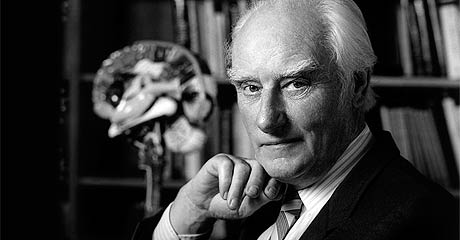Francis Harry Compton Crick was an English molecular biologist, biophysicist, and neuroscientist best known for being a co-discoverer of the structure of the DNA molecule.
Early life
Francis Crick was born on June 8th, 1916 in a small village near the English town of Northampton, in which Crick’s father and uncle ran the family’s boot and shoe factory. From an early age, Francis was attracted to science and devoted a lot of his time to reading scientific books.
Education
At the age of eight, Crick transferred to Northampton Grammar School where he received his formal education until the age of 14, when he attended Mill Hill School in London where he studied mathematics, physics, and chemistry. When he was 21, Crick earned a B.Sc. degree in physics from University College London. Crick later became a PhD student at Gonville and Caius College but was interrupted by World War II. Finally he obtained a Ph.D. in 1954 on a thesis entitled “X-ray diffraction: polypeptides and proteins”.
Achievements
In 1951 Crick assisted in the development of a mathematical theory of X-ray diffraction by a helical molecule which appeared useful for understanding the structure of DNA. Later that same year, Crick started working with James D. Watson at Cavendish Laboratory at the University of Cambridge, England where they developed a helical DNA structure model.
Crick and Watson published their findings in 1953 and were jointly awarded a Nobel Prize in Physiology and Medicine in 1962. With his work, Francis Crick greatly contributed to the effort of understanding DNA and it’s architecture.
Later life
Francis Crick was married twice (Ruth Doreen Crick and Odile Crick), and had three children. He died of colon cancer on July 28th, 2004 and was cremated with his ashes scattered in the Pacific Ocean.
Francis Crick quotes
- “We’ve discovered the secret of life.”
- “For simplicity one can think of the + class as having one extra base at some point or other in the genetic message and the – class as having one too few.”
- “If the code does indeed have some logical foundation then it is legitimate to consider all the evidence, both good and bad, in any attempt to deduce it.”

